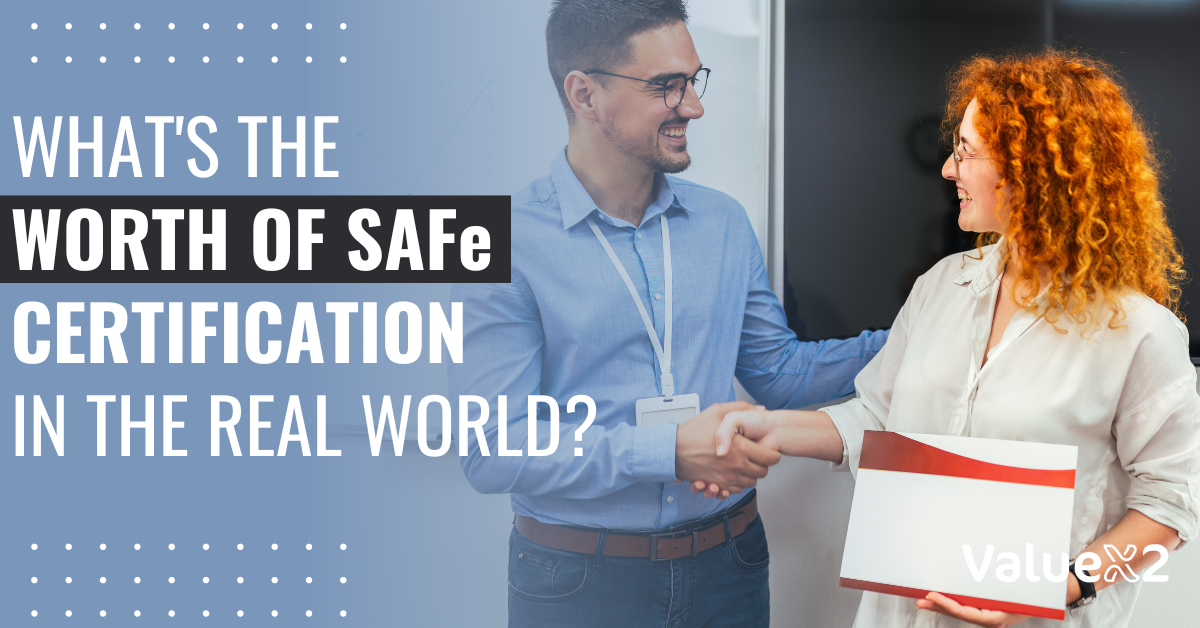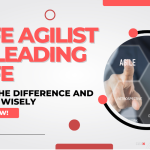Is a SAFe certification really worth it in the real world? Find out what it is, why it’s important and how you can use it to fast-track your Agile career in a saturated job market.

Introduction
As a result of growing interest in using SAFe, many organisations have sought qualified and professional SAFe-certified personnel. Companies understand that such people will help to integrate Agile. Hence, they further deploy it across the departments since they know how it can be done. This demand translates into highly paid jobs, where the SAFe certification is a decisive factor that sets professionals apart in the increasingly crowded Agile job market.
But what exactly does a SAFe certification really mean in the practical context? Is it a way to advance one’s career and improve organisational outcomes or is it just another trend in the Agile world?
Let’s read more about the real-life worth of SAFe certification and uncover the pros of SAFe certification for individuals and organisations.
CHECK OUT POPULAR SAFe CERTIFICATION COURSES ON VALUEX2 | SEE TRAINING SCHEDULES
Understanding SAFe and its Certification
What is SAFe?
Scaled Agile Framework or SAFe is a large and complex system that is employed in order to help an organisation adopt Agile on a large scale. Agile is often implemented in small sessions, which are squads, sprints, or teams, but extending the Agile thought process throughout large-scale organisations with a lot of teams, departments, and projects can be difficult. That’s where SAFe comes to the rescue and offers a framework to maintain alignment, communication, and integration across the organisation.
This is done in the SAFe program by integrating Lean-Agile approaches with already tested processes and corporate models. It uses a system of roles, events and artefacts that help enterprises to navigate in planning, execution and correct alignment of teams for their goals. Through SAFe, organisations can align work in a single large Agile team and increase efficiency and the value generated by the entire organisation.
SAFe certification: What is involved?
Certification in SAFe confirms that the holder is capable of utilising the Scaled Agile Framework extensively in his or her work. These certifications come in various levels as well as positions, making it possible for people in various tenures of their careers to gain knowledge and intelligence in the required field.
Popular SAFe Certifications
- SAFe Agilist (SA): This certification helps to teach professionals about Agile implementation and adoption at scale. This makes it suitable for leaders and managers.
- SAFe Practitioner (SP): For the team members, this certification provides an understanding of the program-level SAFe implementation and how the teams will work within this framework.
- SAFe Program Consultant (SPC): Built for experts, SPC certification enables a person to teach others in SAFe.
- SAFe Product Owner/Product Manager (POPM): Concentrating on those positions associated with the development and management of products in SAFe settings.
- SAFe Scrum Master (SSM): Specifically designed for Scrum Masters in SAFe environments that focus on team integration and program-level implementations.
Certification Process
- Training Requirements: Candidates who have completed their SAFe training course by a certificated trainer are eligible to sit for the exam.
- Exam: After going through the training, the candidates are required to take an exam for certification. The exams are usually in the form of MCQs and they usually cover materials taught in the classroom.
- Prerequisites: Most of the certifications do not have the prerequisites to have prior working experience with SAFe but a few of the higher level certifications like SPC might be required to pass previous certification or experience in Agile.
SAFe Certification Levels
SAFe certifications are structured to cater to individuals at different career stages:
Entry-Level:
SAFe Practitioner (SP): Specifically suitable for members of an Agile team, who wish to learn the principles of SAFe and be a part of an Agile Release Train.
SAFe Scrum Master (SSM): Designed for participants who aim to become Scrum Masters furthering their knowledge about how to facilitate teams in SAFe contexts.
Mid-Career:
SAFe Agilist (SA): Created to help managers and mid-career executives spearhead Agile improvements. Besides, it discusses strategy and scale aspects where Agile should be implemented.
SAFe Product Owner/Product Manager (POPM): Tailored for professionals in mid-n Career Product Development and Product Delivery.
Leadership Roles:
SAFe Program Consultant (SPC): An advanced certification for program managers, directors, and CEOs, undertaking the role of a SAFe Agilist, and leading teams.
SAFe Lean Portfolio Manager (LPM): Designed for those leaders who have responsibility for a portfolio within a Lean-Agile framework.
What is the Value of the SAFe Certification?
There are many questions both certificants and non-certificants have when it comes to SAFe certification; questions like “What is the value of SAFe certification?” and “How useful is SAFe certification?”
Its value can help to gain new positions, increase one’s credibility, and learn tangible methods on how Agile can be implemented on a large scale. For organisations, contracting with people who are certified under SAFe is easy when it comes to the implementation of Agile change and it also increases efficiency in delivering value.
However, if we consider the SAFe Agilist certification cost and others, many people would think of it as an investment, not a waste of money because it gets individuals better jobs and offers the chance to earn more than before besides helping the organisation.
Real-World Benefits of SAFe Certification
Improved Career Opportunities
This is especially true within today’s highly competitive job market wherein one could easily get a job once they get their SAFe certification. Due to the popularity of the Scaled Agile Framework (SAFe) for handling project management and integrating teams at scale, organisations need SAFe practitioners who can help to scale Agile.
Industry stakeholders are now looking for SAFe-certified professionals who can facilitate, direct and improve agile processes. These certifications tell employers that not only do you know the basics of Agile, but you are ready for the challenges and nuances of Agile at the enterprise level. From the industries of IT and finance, all the way to healthcare and manufacturing, many industries have adopted SAFe, and those holding certifications are therefore useful commodities.
Demonstrates Expertise in Scaling Agile
SAFe certification is one of the most valuable opportunities as it proves your proficiency in Agile frameworks scaling. Most of the concepts presented in Agile methodologies are known; however, applying these principles within the context of large-scale organisations presents problems that may be solved only by an expert in this field.
SAFe-certified individuals are equipped to:
- Coordinate the joint endeavours of several groups of stakeholders.
- Synch up strategic targets with total organisational implementation.
- A two-letter acronym ART stands for Agile Release Trains which can be used to improve the efficiency of the organisational work.
- Always apply leanness and agility at the enterprise level.
This knowledge is particularly critical to businesses that seek to attain substantial business agility. This certification will make you a valuable resource in an organisation that perhaps wants to embark on Agility, where you will be able to demonstrate how the organisation can deliver value more efficiently.
Higher Earning Potential
Individuals with SAFe certification tend to earn better than those without SAFe certification. This means that you obtain a certificate that proves that you are capable of managing Agile at scale which is a speciality that employers are willing to offer a premium for.
For instance, the remuneration of a SAFe Agilist is far higher than an ordinary Agile person. Reports from the sector suggest that professionals who have SAFe certification can be paid up to 25% more than personnel in similar positions who aren’t certified. Most roles are specialised such as the SAFe Program Consultants (SPC) which are paid figures without hundreds of thousands of dollars since their skills are a speciality.
Employment Security and Promotion
Focusing on today’s trend where Agile methodologies reign in project management, having the SAFe certification makes you stand out as the one endowed with the knowledge of how Agile can be managed within an organisation.
Certification shows that when you implement Agile, you are not just fully aware of the principles behind Agile, but you also understand how to apply it to large and multiple teams. This can lead to:
- Increased recognition: Your peers, and especially the management team, will turn to you for advice in critical organisational matters.
- Promotion opportunities: Selected personnel having the SAFe certification are recommended for leadership in different change processes in Agile like the Release Train Engineer or Portfolio Manager.
- Better job mobility: This is a global certification which means that you can weigh your chances in various industries and in any part of the world.
Elevate Your Career with ValueX2’s SAFe Certifications
At ValueX2 we understand your capability and thus we empower you with our top-notch SAFe certification that you want in your professional choice.
Whether you are an Agile professional, Scrum Master, or a manager who wants to introduce SAFe into your company or enterprise, our courses are the keys to success. SAFe certifications prove that you have proper knowledge of scaling Agile, so, in industries where Agile at scale is implemented, you are indispensable.
At ValueX2, you will have access to training, mentorship, and an unparalleled education to help you ready for roles in Agile changes. Learn what it takes to be a member of the SAFe community and take the first step toward certification.
Conclusion
It is therefore very clear that SAFe certification, while it comes with value in the real world, is of paramount benefit to both an individual and a corporate entity. The versatility for a professional is introduced to a broader and more significant range of the chances of career advancement, better-paid roles and leadership roles in Agile transformations.
To a company, it is beneficial to hire a professional with a SAFe certificate so that the Scaled Agile Framework is easier to implement as improved inter-team cohesion and value delivery will be achieved.
The roles include SAFe practitioner, SAFe Agilist, SAFe architect, SAFe project manager, and the most senior level, SAFe program consultant. Even though the SAFe Agilist certification cost, or any other related fee associated with it, may seem like you are spending a lot of money, the value you get then is worth the investment, in terms of a better job, recognition, and higher pay.
Frequently Asked Questions (FAQs)
Q. What is the use of SAFe Certification?
Ans. SAFe certification ascertains proficiency in the implementation of the Scaled Agile Framework which helps scale Agile in big organisations. First, it makes career progression possible, second, it proves proficiency in Agile transformation, and finally, it increases income.
Q. Is SAFe certification recognized globally?
Ans. Yes, SAFe certification is an internationally recognized certification and is valued by many industries. This approach has received wide acceptance across the world due to the effectiveness of moving teams to the right projects, increasing productivity and attaining business adaptability in demanding projects.
Q. How long does it take to get certified in SAFe?
Ans. The time taken depends on the level of certification one is pursuing in his or her profession. For example, the SAFe Agilist certification includes a two-day course and an online test after it. Normally, most candidates do it with ease in less than a week of preparation.
Q. Does SAFe certification require previous Agile experience?
Ans. Having prior Agile experience is now preferred, but not a requirement for basic-level certifications such as SAFe Practitioner. In the more senior position, basic Agile knowledge allows for getting the most out of the SAFe certification.
Q. Is SAFe certification worth it for small organisations or startups?
Ans. Yes, regardless of the company’s size ranging from small to large, or even start-ups, they could gain from SAFe certification. It offers frameworks for Agile, improving the alignment of teams, and delivering organisational value, all of which are critical for growth.






